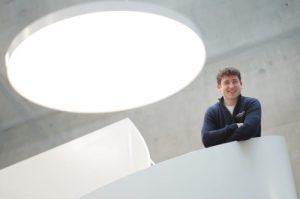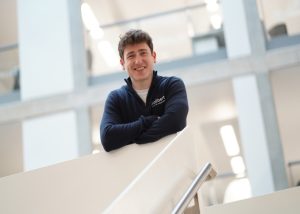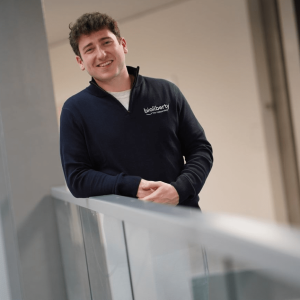
Rowan Armstrong, BioLiberty CEO, spoke with us about their technologies, the positive difference he would like to make and the role the DDE Programme has played in getting BioLiberty to where they are today.

Rowan: Before BioLiberty, I worked for a couple of big medical device companies. Ross, my flatmate and co-founder, came to me with an idea. His aunt has MS and through her experiences, he realised there was very little technology to help her in dealing with hand weakness and assistive hand rehabilitative technology. He’d seen a gap in the market and knew I had the expertise to help fill it. That was two years ago, and it’s gone like a flash. Now we’re full time.
Rowan: BioLiberty is in the medical robotics industry and our first product is an exoskeleton robotic glove that helps people carry out rehabilitative exercises by providing resistance training, while also measuring key metrics related to hand mobility. Our first target conditions are trauma and stroke and we’ll be looking at MS, arthritis, carpal tunnel syndrome and other conditions further down the pipeline.
Rowan: Our glove gathers data against key metrics like range of motion, maximum force and response time. This information can be fed back to the user so they can track their own therapy, but also to healthcare professionals, such as an occupational- or physio-therapist. Gathering data like this allows the possibility of a remote rehabilitation model.
We’re also looking at ways to build the infrastructure in a way so that when the glove is first worn, it’ll measure your starting point and then use machine learning algorithms to start recommending the best exercises, based on data from other people’s rehabilitative journeys.
Rowan: You’re not going to be able to do it by yourself. You’re going to need help, whether that’s co-founders, an accelerator or a programme that’s going to expose you to other companies like DDE does. A good network is essential and so is surrounding yourself with good people, especially ones in your industry.
Rowan: In my eyes, bringing new people onto the team has been a huge measure of our success so far. Finding the right fit and building on our cultural purpose, knowledge and morale is huge. It will help us reach our ultimate goal of giving the hundreds of thousands of people who are undergoing a difficult experience the ability to get a grip back again – and then scaling the technology to other parts of the body.
Rowan: I feel like we’ve been the perfect example of a company that’s gone through each step of DDE’s pipeline. We received DDE’s Seed Fund award which we’ve now converted into shares. We’ve also taken a PhD student into our team, something that was facilitated by the DataLab and funded by DDE, and received Intensive Business Advisory support on our SMART application, which led to us securing a grant of £100k from Scottish Enterprise.
We were lucky to get a place on the AI Accelerator, I think we were the earliest stage company on the cohort. Being among such giants of data innovation in the networking sessions meant we learnt a huge amount. It was also great to attend sessions on purpose, branding, marketing, and operations. The Programme Manager even organised some health-tech specific roundtables for us.
Rowan: Ross worked in Heriot-Watt as an Enterprise Executive, meaning he advised a lot of the start-ups there, and the National Robotarium is a project between Edinburgh University and Heriot-Watt. So we’ve been able to benefit from the synergies between the organisations.
Rowan: I went to the University of Edinburgh and I remember being impressed by how much was going on in terms of enterprise and development. As we’ve grown, I’ve realised just how much support there is, from organisations like Scottish Enterprise, University of Edinburgh and so many more.
Rowan: We’re very excited to be doing a clinical study for ‘Life Club’ over the summer where we’ll be bringing our product into a clinical environment. Next, we’ll be looking at ramping up manufacturing and actually launching ‘Life Club’ in the UK and the US. Then it’ll be looking at how our technology can scale up to other parts of the body.
